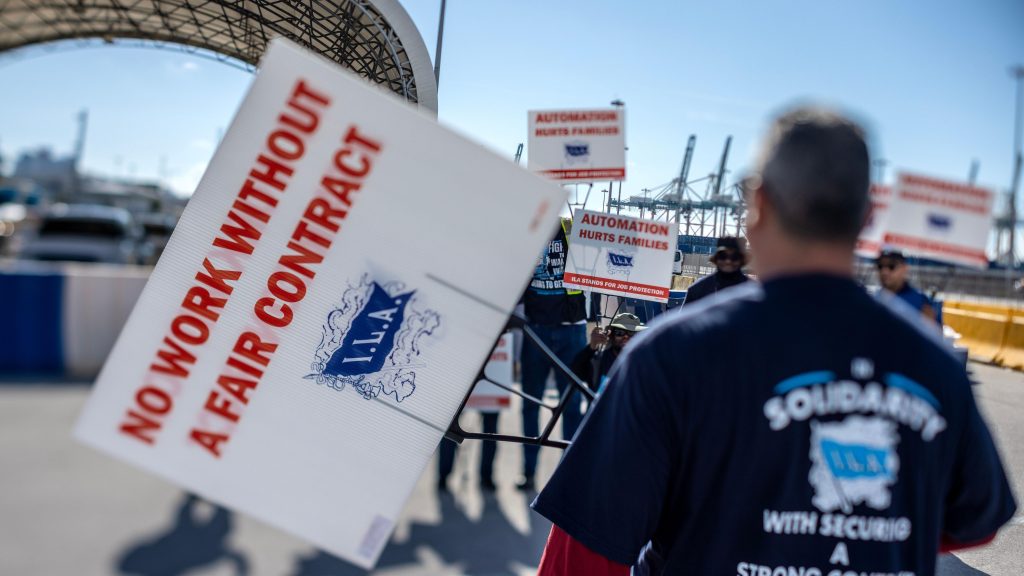
The striking dockworkers across major U.S. ports have made it clear: they will not return to work until their pay demands are met. Harold Daggett, president of the International Longshoremen’s Association (ILA), asserted this commitment during a recent picket line in New Jersey. “We’re going to fight for it and we’re going to win, or this port will never open up again,” Daggett declared. “I’m not playing games here.”
As the strike continues, businesses are preparing for the potential consequences of a prolonged shutdown, which threatens to disrupt global trade and significantly impact the U.S. economy. President Joe Biden has resisted calls from major business groups to intervene by imposing an 80-day cooling-off period to allow for further negotiations. He emphasized that workers, who risked their health during the pandemic to keep ports operational, deserve a substantial wage increase. “Now is not the time for ocean carriers to refuse to negotiate a fair wage for these essential workers while raking in record profits,” Biden stated.
The Impact of the Strike
This strike is notable not only for its scale but also because it is the first action taken by the ILA since 1977. It has resulted in a complete halt of container traffic across 14 of the busiest U.S. ports, including key locations in New York, Georgia, and Texas. These ports handle more than a third of the nation’s imports and exports, meaning the disruption could lead to significant delays in the delivery of goods for both businesses and consumers.
In light of the potential for price hikes due to shortages, Biden has instructed his administration to monitor the situation closely. Following months of stalled talks, the United States Maritime Alliance (USMX), which represents shipping firms and port associations, has indicated that the two sides are now exchanging proposals again.
The previous contract, which expired on Monday, set base hourly wages for dockworkers between $20 and $39, along with additional benefits tied to container traffic. USMX has stated that its most recent offer includes nearly a 50% wage increase, tripling company contributions to retirement plans and enhancing healthcare benefits. The organization described its proposal as exceeding “every other recent union settlement” and termed the current deadlock as “completely unavoidable.”
Stalemate and Demands
Despite these offers, Daggett has claimed that nothing substantive has been done to bridge the gap between the union and the companies involved. He indicated that he is willing to keep the ports closed until the companies agree to a $5 hourly pay increase for each year of the new contract. The ILA, representing approximately 47,000 active members, is also seeking protections against the impacts of automation in the industry.
“I’m going to fight for it because those greedy companies are making billions of dollars and they don’t want to share,” Daggett asserted. “I want my members taken care of for the rest of their lives, and that’s why we’re out here.”
If the strike persists, the economic fallout could escalate, leading to price increases and shortages across various sectors. Anne-Sophie Fribourg, a vice president at freight forwarding company Zencargo, highlighted the potential massive disruptions, stating, “We are seeing now that ships are starting to anchor outside of the ports waiting to see what is going to happen.”
Currently, there are about 100,000 containers awaiting unloading in the New York area, with 35 additional ships expected to arrive this week. Danny Reynolds, the owner of a clothing store in Indiana, expressed concern over delayed shipments, noting that 25% of his inventory has yet to arrive. His main worry centers on special-order bridal gowns needed for upcoming weddings, stating, “That’s a hard thing to explain to a potential bride.”
The Call for Action
Reynolds, whose store routes about 75% of its merchandise through East Coast ports, believes the longer the strike lasts, the more devastating the economic impact will be. He has urged the Biden administration to take action, suggesting it is time for the president to engage with both sides to facilitate a resolution.
“I think it’s beyond time for the Biden administration to sit down at the table and see what can be done to open things back up,” he said.
As the situation evolves, the repercussions of this strike could extend far beyond the docks, affecting supply chains, prices, and ultimately, the livelihoods of millions across the country. The commitment of the dockworkers, coupled with the rising tensions between labor and management, indicates that the path to resolution will require substantial negotiation and compromise from all parties involved.








